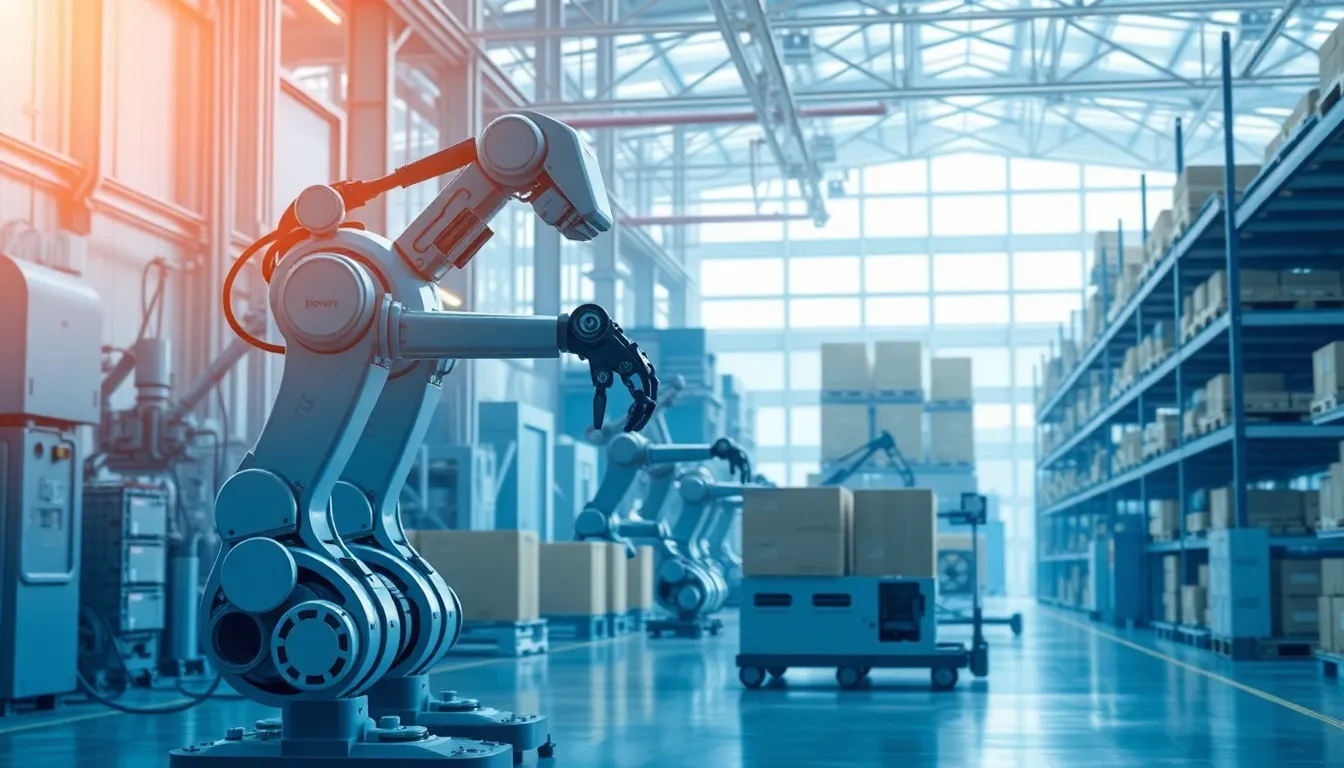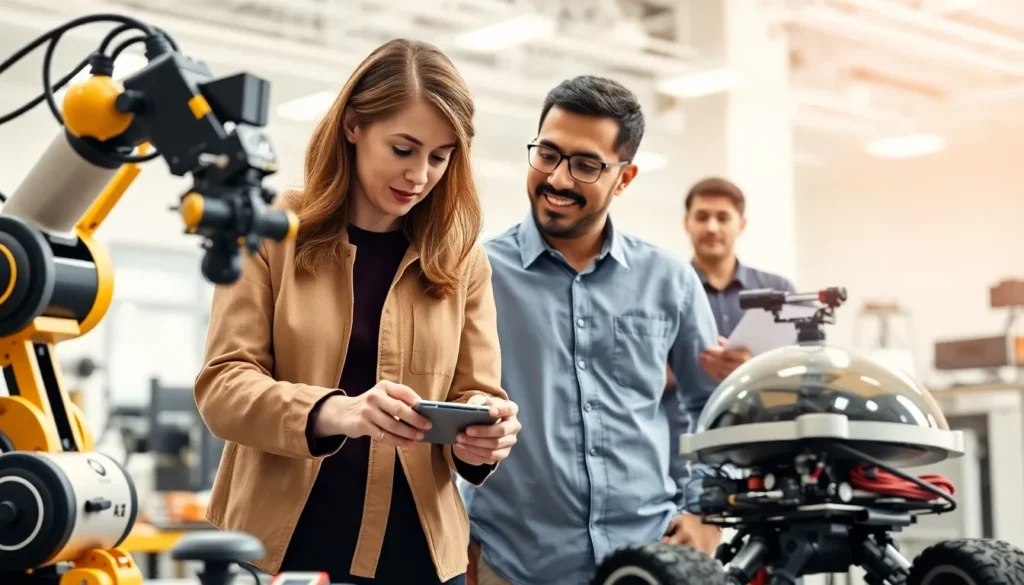Table of Contents
ToggleIn a world where robots are no longer just the stuff of sci-fi movies, the robotics industry is booming like never before. From self-driving cars to robotic chefs, these mechanical marvels are reshaping our lives in ways we never imagined. If you think your morning coffee is brewed by magic, think again—it’s probably a robot doing all the heavy lifting!
Latest Trends In Robotics Industry News
The robotics industry continues to evolve rapidly, with innovations reshaping various sectors. Key trends highlight advancements in automation and the integration of artificial intelligence.
Automation Advancements
Automation in robotics emphasizes efficiency and precision. Manufacturing processes increasingly utilize robotic arms to enhance production speed. Organizations implement collaborative robots known as cobots, which assist human workers while ensuring safety. This move towards automation has resulted in reduced labor costs and improved product quality. Significant growth occurs in the agricultural sector, where automated systems monitor crops and optimize harvesting. Businesses across industries adopt these advancements to streamline operations and maintain competitiveness.
AI Integration
AI integration plays a crucial role in driving robotics forward. Intelligent algorithms enable robots to learn from their environment and adapt to new tasks. Systems powered by AI enhance decision-making abilities, allowing for greater autonomy in complex scenarios. Industries such as healthcare benefit from robotic assistants that provide support during surgeries and patient care. Moreover, natural language processing transforms human-robot interaction, making communication smoother and more intuitive. As AI technologies progress, their influence on robotics continues to expand, transforming how industries operate.
Key Players In The Robotics Industry

Key players shape the robotics industry, influencing trends and advancements. Companies focus on automation and AI to enhance their offerings and improve productivity.
Major Companies
Siemens, Boston Dynamics, and ABB lead the robotics sector. Siemens excels in automation technology, providing integrated solutions for factories. Boston Dynamics captures attention with dynamic robotic systems, renowned for their agility and versatility. ABB specializes in industrial robots, particularly in manufacturing and logistics. These companies consistently innovate, pushing the boundaries of what robots can achieve across various applications.
Startups To Watch
New startups emerge, bringing fresh perspectives to robotics. Clearpath Robotics develops autonomous vehicles for industrial use, transforming material handling. Kiva Systems, acquired by Amazon, optimizes warehouse operations with its robots. Another notable startup, Fetch Robotics, focuses on collaborative robots for logistics and supply chain management. Each startup contributes unique advancements, setting the stage for significant industry disruptions.
Impact Of Robotics On Various Sectors
Robotics significantly impacts various sectors, transforming operations and enhancing efficiency. The manufacturing and healthcare industries exemplify this transformation.
Manufacturing
Manufacturing processes benefit greatly from robotics. Automation leads to increased production speed and precision. Industrial robots assemble products, ensuring consistent quality and reducing errors. Cobots work alongside human operators, enhancing both safety and productivity on the factory floor. According to recent reports, automated systems in manufacturing can boost efficiency by up to 30%. Major companies, like ABB and Siemens, continually innovate to develop advanced robotic systems that streamline workflows. These advancements in manufacturing not only cut costs but also foster job creation in robot design and maintenance, proving that robotics enhances productivity without entirely displacing human workers.
Healthcare
Healthcare environments increasingly adopt robotics for improved patient care. Robotic surgical systems enable surgeons to perform minimally invasive procedures with greater precision. Telepresence robots facilitate remote consultations, offering patients access to specialists regardless of location. According to a 2023 study, robotic assistance in surgeries can reduce recovery times by 50%. Robotics also supports rehabilitation, with exoskeletons aiding movement recovery for patients. Companies like Intuitive Surgical lead this sector, developing innovative solutions that enhance surgical outcomes. The integration of robotics in healthcare not only improves efficiency but also transforms patient experiences, making care safer and more effective.
Challenges Facing The Robotics Industry
Various challenges impact the robotics industry as it evolves. Supply chain issues and ethical considerations play significant roles in shaping its future development.
Supply Chain Issues
Supply chain disruptions affect the robotics industry, leading to delays and increased costs. Companies encounter difficulties sourcing essential components such as sensors, microcontrollers, and batteries. A 2022 survey indicated that 65% of robotics manufacturers experienced supply chain challenges, limiting production capacity. Long lead times for critical parts contribute to the struggle. Manufacturers must adapt by exploring alternative suppliers and improving inventory management strategies. Organizations that successfully navigate these disruptions can gain a competitive edge by ensuring timely delivery and consistent product quality.
Ethical Considerations
Ethical considerations present another challenge for the robotics industry. As technology advances, questions arise regarding job displacement and the moral implications of automation. Automation leads to concerns about workforce transitions, with experts estimating that 20 million manufacturing jobs worldwide could become automated by 2030. Additionally, privacy concerns are significant regarding data collection and surveillance capabilities of robots. Public trust hinges on transparency and ethical frameworks guiding robotics development. Developing comprehensive guidelines can promote responsible practices and address societal concerns, leading to broader acceptance of robotic systems.
The robotics industry is on an exciting trajectory that promises to reshape numerous aspects of daily life. As automation and AI continue to evolve, the integration of robotics into sectors like manufacturing and healthcare is becoming more pronounced. Companies are not only enhancing efficiency but also improving safety and quality of life through innovative solutions.
While challenges such as supply chain issues and ethical concerns remain, the industry’s proactive approach to these obstacles is encouraging. By fostering transparency and responsible practices, the robotics sector can build public trust and acceptance. As the landscape of robotics expands, it’s clear that the future holds immense potential for transformative advancements that could redefine human experiences.







